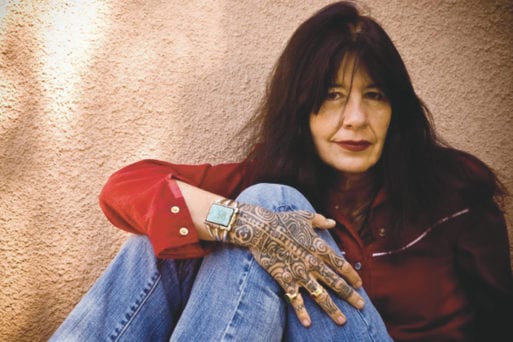
Credit: Camille Styles, Pinterest
The world begins at a kitchen table. No matter what, we must eat to live.
The gifts of earth are brought and prepared, set on the table. So it has been since creation, and it will go on.
We chase chickens or dogs away from it. Babies teethe at the corners. They scrape their knees under it.
It is here that children are given instructions on what it means to be human. We make men at it, we make women.
At this table we gossip, recall enemies and the ghosts of lovers.
Our dreams drink coffee with us as they put their arms around our children. They laugh with us at our poor falling-down selves and as we put ourselves back together once again at the table.
Joy Harjo, three-time Poet Laureate of the United States, is part of the Muscogee (Creek) Nation and lives in Tulsa, Oklahoma. She is known for weaving symbolism, imagery and history seamlessly within her poems. “Perhaps the World Ends Here” shares the powerful symbol of the kitchen table, a staple piece of furniture in most homes, as the place where life happens. Harjo uses the table as the setting for all the important moments in our lives, not just eating dinner. This is the table we gather around to share a meal, raise children, bond with friends, sit in solitude and “put ourselves back together.”
This table has been a house in the rain, an umbrella in the sun.
Wars have begun and ended at this table. It is a place to hide in the shadow of terror. A place to celebrate the terrible victory.
We have given birth on this table, and have prepared our parents for burial here.
Harjo reminds us of the usefulness of the table; it is more than just a place to lay our food. It’s been shelter from the rain and scorching sun of life. This table we share with those we love has been a place of passion, disappointment and growth. It’s where our family has begun and ended their lives throughout generations. Young and old are fed here, from tiny morsels to full, extravagant meals. From when there was barely enough to go around to when we didn’t know how we’d eat all of these leftovers before they went bad, this table has been the place we gather together to feed ourselves and each other.
At this table we sing with joy, with sorrow. We pray of suffering and remorse. We give thanks.
Perhaps the world will end at the kitchen table, while we are laughing and crying, eating of the last sweet bite.
The poet laureate speaks of the dualities of life: joy and sorrow, suffering and thanks. All of the peaks and valleys of life are keenly felt at the table, where we sing, pray and remember the good bits. Harjo muses that life could end there, the table where everything was shared through laughter and tears. In her vision, we’ll all get to savor the final bite together, and it will be sweet. She reminds readers to enjoy their meal of life until the last morsel is gone, to eat together until there’s none left.

Joy Harjo
Credit: Karen Kuehn, Blue Flower Arts

 “Perhaps the World Ends Here” by Joy Harjo
“Perhaps the World Ends Here” by Joy Harjo


 First the Wealth Gap, Now the U.S. Has a Growing Health Gap
First the Wealth Gap, Now the U.S. Has a Growing Health Gap
 How to Comfort A Dying Loved One
How to Comfort A Dying Loved One
 Our Annual Seven Holiday Gifts for Someone Who Is Grieving, 2024 Edition
Our Annual Seven Holiday Gifts for Someone Who Is Grieving, 2024 Edition














